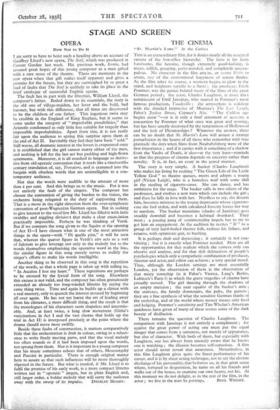STAGE AND SCREEN
OPERA
How Not to Do It
I AM sorry to have to hoist such a heading above an account of Geoffrey Lloyd's new opera, The Serf, which was produced at Covent Garden last week. His previous work, lernin, had aroused great hopes of this young composer as a man gifted with a rare sense of the theatre. There are moments in the new opera when that gift makes itself apparent and gives a promise for the future, but they arc outweighed by so great a load of faults that The Serf is unlikely to take its place in the brief catalogue of successful English operas.
The fault lies in part with the librettist, William Lloyd, the composer's father. Boiled down to its essentials, the story is the old one of village-maiden, her lover and the bold, bad baronet, but with this difference, that all three are discovered to be the children of one father. This ingenious twist may be credible in the England of King Stephen, but it seems to come under the category of " improbable possibilities," that Aristotle condemned as only little less suitable for tragedy than impossible improbabilities. Apart from this, it is not really fair upon the audience to spring this surprise upon them at the end of Act H. Inevitably they feel they have been " sold." Still worse, all dramatic interest in the lovers is evaporated once it is established that the girl cannot marry either of the men, and nothing is left for the last act but padding and high-flown sentiments. Moreover, it is all couched in language so deriva-. tive from old operatic convention that it reads like a nineteenth. century translation of, say, Trovatore, and is crammed into the bargain -with obsolete words that are unintelligible to a con- temporary audience.
Not that the words were audible to the amount of more than 2 per cent. And this brings us to the music. For it was not entirely the fault of the singers. The composer has chosen the convention of giving the burden to the voices, the orchestra being relegated to the duty of supporting them. That is a move in the right direction from the over-symphonic convention of post-Wagnerian German opera. But in seeking to give interest to the vocal line Mr. Lloyd has filled it with little twiddles and niggling divisions that make a clear enonciation practically impossible. Perhaps he was thinking of Verdi. But if we compare the song given to the Squire at the opening of Act II—I have chosen what is one of the most attractive things in the opera—with " Di quella pira," it will be seen that, whereas the quaver figure in Verdi's airs acts as a sort of fulcrum to give leverage not only to the melody but to the words themselves emphasising the operative word in the line, the similar figure in this song merely serves to nullify the singer's efforts to make his words intelligible.
Another thing to be observed in this song is the repetition of the words, so that a whole page is taken up with telling us, " In Ascalon I lost my heart." These repetitions are perhaps to be excused by the lyrical form of the song. Elsewhere this excuse is not valid, and the composer has often gratuitously extended an already too long-winded libretto by saying the same thing twice. Time and again he builds up a climax with a real mastery, only to quench the interest aroused by beginning all over again. He has not yet learnt the art of leading away from his climaxes, a more difficult thing, and the result is that the monologues of his characters seem shapeless and intermin- able. And, at least twice, a long slow movement (Githa's vaticinations in Act I and the vast chorus that holds up the trial in Act II) is interposed precisely, at the point where the drama should move most swiftly.
Beside these faults of construction, it matters comparatively little that the orchestration is drab in colour, owing to a reluct- ance to write freely moving parts, and that the vocal melody too often sounds as if it had been imposed upon the words, not sprung from them. Nor is it important in a young composer that his music sometimes echoes that of others, Moussorgsky and Puccini in particular. There is enough original matter here to assure us that such influences will be more thoroughly digested in the future. But what is needed, if Mr. Lloyd is to fulfil the promise of his early work, is a more compact libretto written not in "operatic jargon, but in plain English and, still larger order, a bolder melody that will carry the audience
away with the sweep of its impulse. DYNELEY liUSSEY.-
























































 Previous page
Previous page